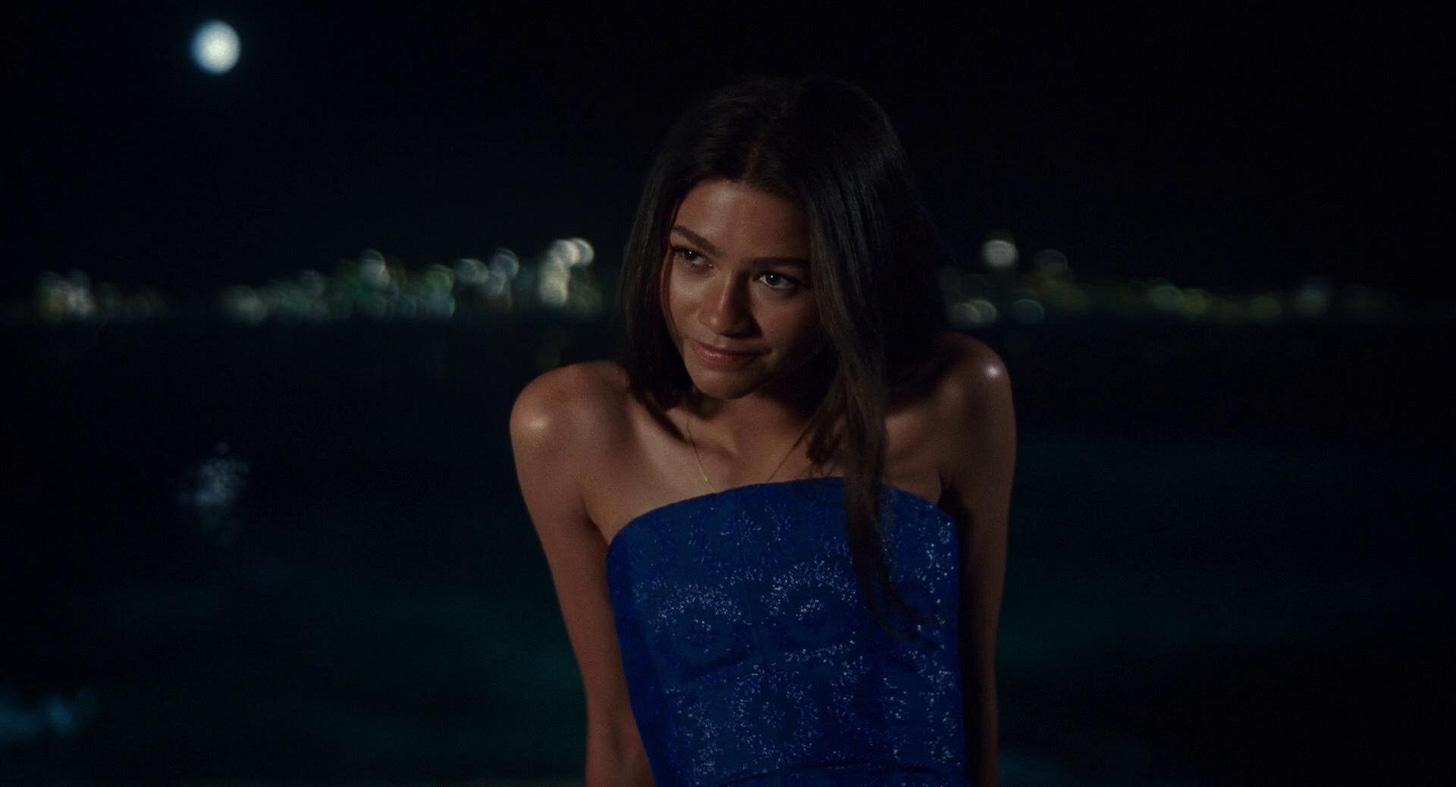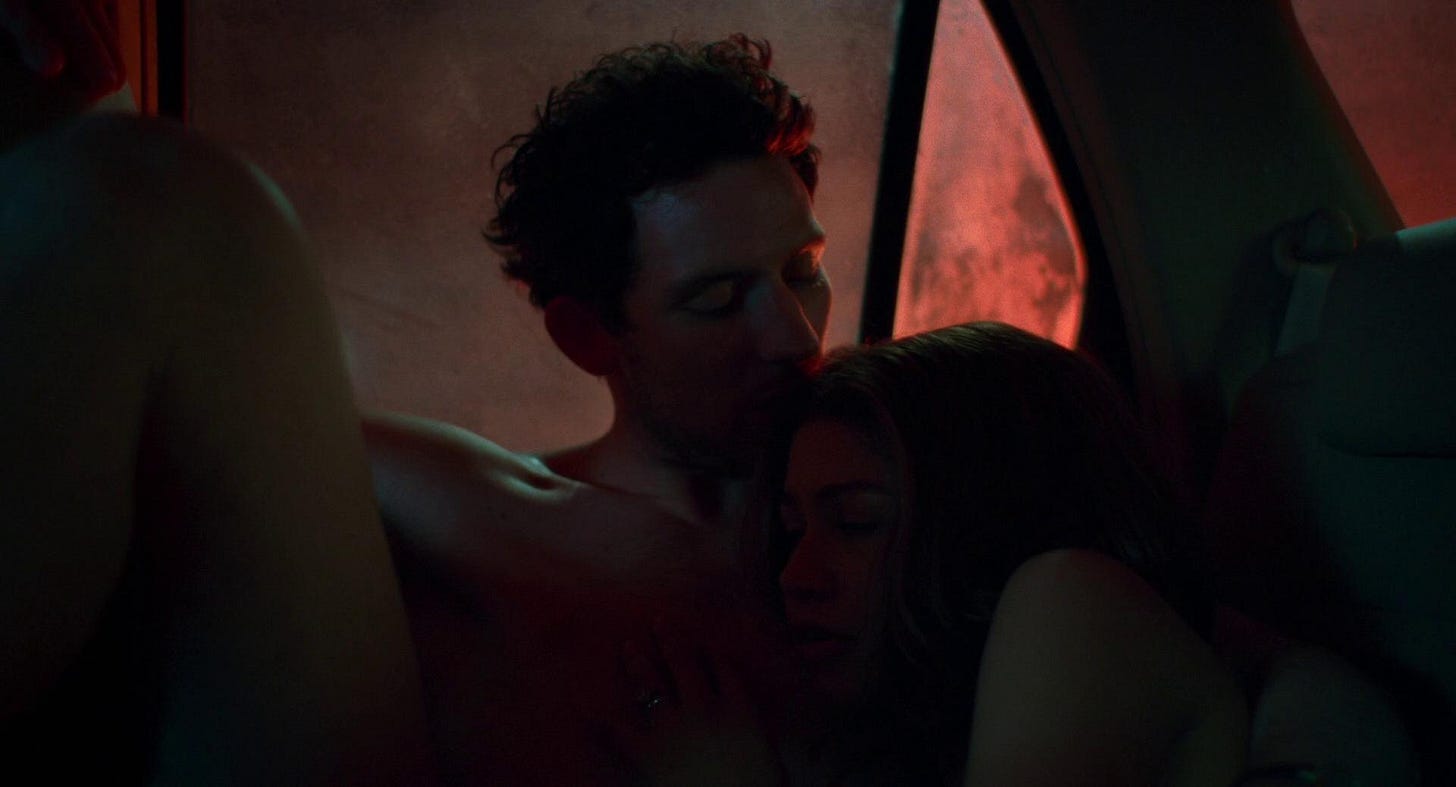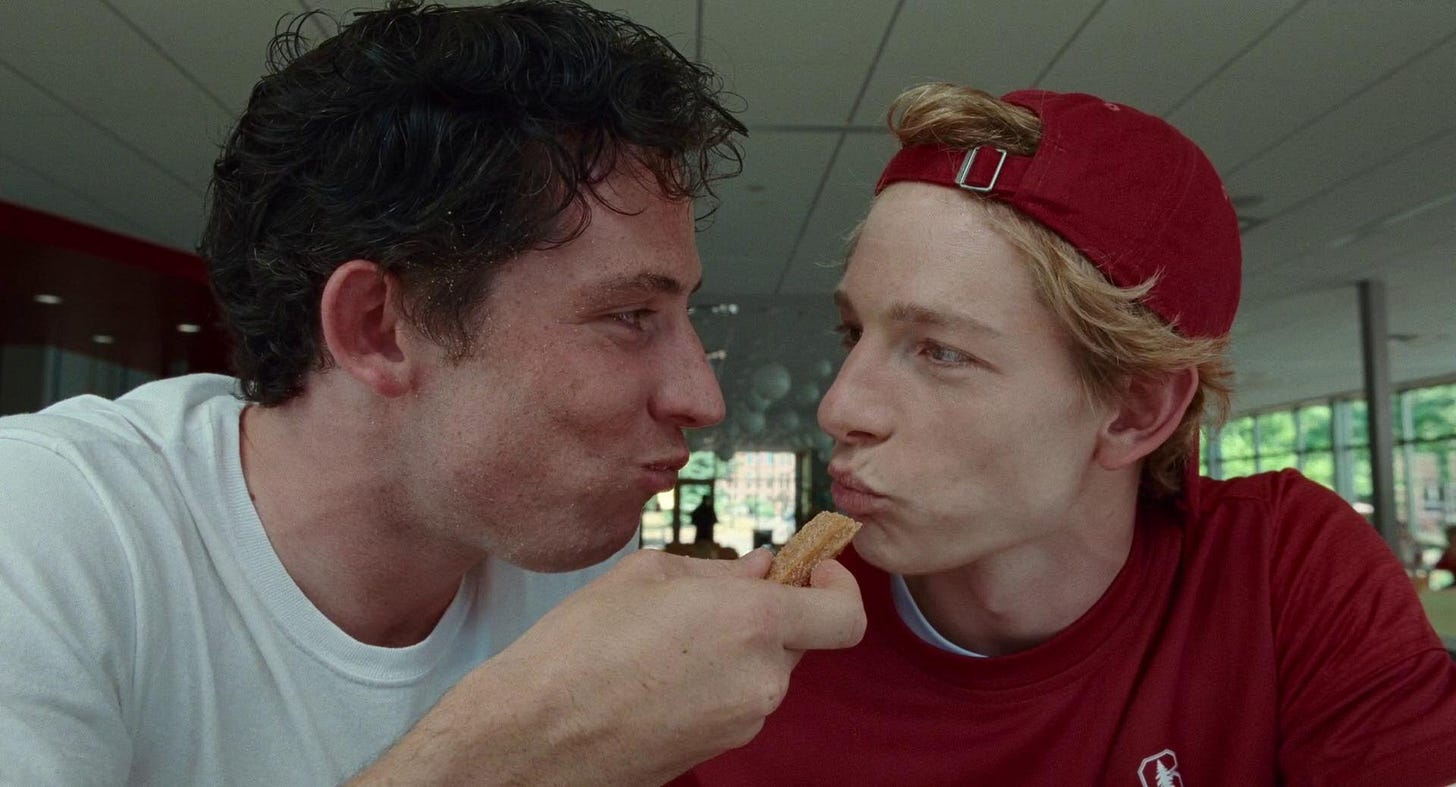sex, tennis, and videotape
on 'Challengers,' film criticism, and the baggage we bring to the movie theatre
“Have you guys seen Poor Things?”
While it will never stop being a fun, fruitful, or interesting exercise, attempting to express how good a piece of art or media is [to you!] is not for the faint of heart. It’s barely meant for a quick lunch date that’s bigger than a group of three.
I enjoyed Poor Things—quite a bit actually. I laughed a lot and was treated to some Yorgos Lanthimos weirdness. My boxes were checked, but I also didn’t have any huge critical realizations to share other than that. This question from my friend, Subin, was a trap.
There is absolutely nothing more humbling than talking about your positive feelings toward a film, biting into your sandwich, and then hearing your friends rip into it for the next few minutes. The group’s consensus was a vitriolic thumbs down, to say the least, but of course, I’m interested in the why.
Here’s the Wikipedia summary of Poor Things: “It focuses on Bella Baxter, a fetus in the body of an adult woman in Victorian London who is saved from her mother's suicide via brain transplant and embarks on an odyssey of self-discovery.” I’ll give my friends credit. That “self-discovery” is in fact Emma Stone, with the brain of a young child, having sex with a series of gross men for money.
Subin probes me, the lonely Poor Things enjoyer, “Don’t you find that depiction harmful?”
I counter, “Isn’t that depiction the point?”
I witness this sort of impasse often when chatting about new films. My friends and I can agree on what we’re observing, but the how of how we read it is completely different. We can agree that Poor Things is far from feminist, but can’t find a common ground of whether that failure is intentional or a critique of certain kinds of feminism. This is where Subin and I agreed to disagree, but mentally I felt myself conceding. I feared I may have been projecting more generous, progressive ideals onto a movie that most likely didn’t come with them. It’s the same reason why no one can seem to agree on what counts as satire nowadays.
There’s no one correct way to read a film, but this conversation about Poor Things left me wondering: When is a film worth arguing about if we can’t even agree on what the film is, where it comes from, and what it’s trying to say? Should we even try to agree at all? Especially, when what moves you about a movie—what makes you love it—seems nebulous and unconquerable in the first place?
These questions bring me to Challengers. I won’t downplay my feelings about this film, especially when public record1 exposes them clear as day: I fucking love Challengers. I could write thousands of words about why. I would talk about Luca Guadagnino and love triangles and synths and chest hair and Americana and Past Lives and the beauty of a well-placed T-shirt.
I pay a lot of attention to that which I love, but I also get a sick satisfaction from engaging with negative opinions about the media I hold near and dear. On a recent episode of the Bill Simmons Podcast, Bill invites Wesley Morris, a critic at The New York Times whose work I deeply admire, to air out their grievances with Challengers, Zendaya, and contemporary films like it. Here are some brief excerpts of what they had to say:
BILL: (0:07:20) I just don’t know who this movie was for, and I don’t know why Luca made it other than that he was fascinated by the world of tennis, by three relationships intersecting and that was kind of all he had… but some people really liked it. I don’t think some people care. I think some people just like the vibe of it and the music and everybody looks good…Me? I was bored.
Later, Wesley introduces his central frustration with Challengers:
WESLEY: (0:11:05) This is not a tennis movie! This is a movie where tennis is a stand-in for sex, and the movie is afraid of the sex to be had among all three of these people, and so it keeps giving you the metaphor…
BILL: …It’s the least sex sexy movie… and I really like [Zendaya] as an actress, it’s almost like they needed somebody who didn’t have all the A+ list celebrity baggage that she has… this is a much dirtier movie than the movie they made.
Yeesh. First, I’ll argue about the tennis and the sex. Then, I’ll work backward to dissect what is possibly my least favorite question in all of film criticism: Bill’s “Who is this movie for?”
I agree that Challengers is not a tennis movie. In fact, you could switch out tennis for other competitive sports or lifestyles and it would probably still work. Imagine Tashi, Art, and Patrick as, say, swimmers or figure skaters or classical musicians.2 In Challengers, tennis is simply the drug of choice to explore these three big relationships and this “love triangle where all corners touch.” It’s a simple but rich concept with the iconography and choreography of tennis as a delicious, sweaty backdrop.
Consequently, Wesley’s argument that this film relies too heavily on tennis as a metaphor for sex feels incomplete to me. In Challengers, the tennis and the sex go both ways, where one gets across what the other can’t. Part of the genius of tennis as a vehicle to explore this triangle is the gendered component of the sport, where most of the time men play men and women play women. Tashi never needs to face Patrick or Art on a tennis court, but she finds a way to play the game with them through sex, companionship, and romance. On the other hand, the only way Art and Patrick have learned to deal with the sexuality between them is on the court, playing side-by-side or opposite one another. Art and Patrick need Tashi and tennis to fully express their feelings for one another, and Tashi needs a way to maintain a closeness to the sport she’ll never win on her own again.
In Challengers, tennis and sex are used strategically to showcase the tensions that bend and break each side of this true love triangle. In the text, the tennis and the sex are treated the same way. While we see these characters win or lose games and sets, we almost never get to see them win a whole match.3 Rather, the plot makes you put it together yourself. For example, the way we know that Art loses the match to Patrick when they’re playing for Tashi’s number is when the film flashes forward and we hear Art teasing Patrick about whether or not he and Tashi have slept together yet. You don’t need cheers, a trophy, or a napkin with some scribbles on it to know Patrick goes on to win the match and Tashi’s number.
Similarly, with the sex, we only get the prelude and the aftermath. The lack of simulated sex scenes in Challengers indicates not that the film is scared of the sex but that it simply has different priorities, where, in this story, the sex is the end of a match and not the beginning.
To push back more on what Bill and Wesley suggested for this movie, sex scenes are not a shortcut to edginess, risk, or intrigue. I love sex in my movies, but I found that with Challengers if you exhale and stop waiting for the capital sex SCENE to come, that's what unlocks the movie. The visual wouldn't be unnecessary, it wouldn't be unpleasurable, but it would say something different. The movie would become different, and so I say go watch a different movie! Passages (2023) is right there!!4
So, let’s zoom out. How exactly can two critics whose work I greatly enjoy, seem to loathe the things about this movie that I find pretty clear and enjoyable? How is it these two men can ask the question “Who is this movie for?” when that question never even had to cross my mind?
Pretty simple: Sometimes movies just leave us wanting. We try hard to guess what we were missing or what we would’ve needed to have enjoyed ourselves more, and most of the time I think we just need a different movie. I often think about a tweet from The Ringer’s Alison Herman: “as critics I think we sometimes undersell how much of our work is retroactively making sense of a gut reaction.”
I find the criticism that I really respond to is transparent and eager to explore that gut reaction. The criticism that makes me recoil conflates a gut reaction of boredom with broader industry trends in order to argue that both are true and real. [e.g. Bill and Wesley use their distaste for Challengers to explain this growing sterilization of Hollywood films. Both valid and worthy conversations to have that get muddied when we don’t take care to distinguish them. But, hey, maybe that’s just podcasting!].
Totally anecdotal, but I find that male critics are guilty of this conflation slightly more often than everyone else. That question “Who is this movie for?” is always at the scene of the crime of criticism that distances itself from the object of its ire. We will always need cutting, negative critiques of popular media, and, at the same time, it feels lazy when critics refuse to acknowledge their preferences and socialization as important reasons for why a film didn’t work for them. [See: Turning Red]
Most good criticism is also personal. What I love about Luca Guadagnino’s movies is how much they center pleasure and blatant horniness. So much so, I feel like Challengers is a great litmus test for how vulnerable a viewer is willing to get when discussing whether or not they enjoyed themselves while watching it. Challengers feels complete to me because I give it the time of day. With my experience, my projections, and my love, Challengers comes alive. I can’t help but meet it where it’s at.
While watching Bill and Wesley’s conversation, I think I actually wanted them to take some more risks. If you didn’t find the movie sexy enough, then say why! Say why it didn’t turn you on in great detail! Quickly! One of the strangest, but most memorable moments about the conversation was the two of them proposing other actresses that could’ve carried the sexual needs of the movie better than Zendaya could have.
BILL: (0:24:40) I don’t think Zendaya was ready for a movie like this which is why I think they scaled it back. Like, if Alexandra Daddario is in this, is the movie different?
WESLEY: [through laughter] Yes, that’s a great question, Bill! It is different…
BILL: If mid-90s Halle Berry is in this, is the movie different? If early-90s Robin Givens is in this…
This exercise is 20% gross and 80% compelling, because—just for a moment—you get a glimpse into these guys’ gut reactions about this movie that’s chemically formulated to make you fantasize—to make you sweat a little. In true Challengers fashion,5 it once again takes the idea of a woman to allow two men to get closer to what’s really going on between them: They just wanted to watch “some good fucking [and] tennis.”
Three Letterboxd reviews, 4.5, 5, and 5 stars, respectively.
AO3, Wattpad, and Crunchyroll are calling!
We get to see Patrick and Art win their doubles tournament. Maybe there’s something here about how none of these three can really win when they’re alone…
“A gay couple's marriage is thrown into crisis when one of them impulsively begins a passionate affair with a young woman.” No explicit threesome here. It’s another play on a love triangle with tons of great sex. This movie rocks.
According to Patrick, what’s missing from Art’s tennis is the fire he gets from being jealous of him and Tashi’s relationship.







